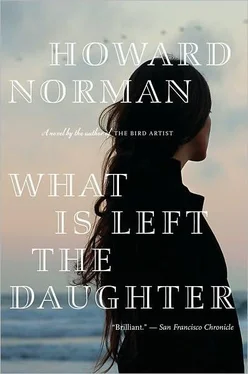There were some bureaucratic glitches, so to speak, but I was finally released on June 15, 1945. I took a room at the Baptist Spa — since I had last stayed there, the room rate had gone up fifteen cents per night — and right off posted a letter to Cornelia Tell, saying which bus I'd be taking home. She must've told Tilda, and so it was the world's biggest surprise that it was Tilda who met me at the Esso station in Great Village, at about seven P.M. on June 19. Why she would decide, against all logic, to do that, I hadn't the slightest idea.
What with dusk tinged rose and magenta on the horizon, it was a lovely evening, clear all the way across the Minas Basin. Tilda was driving her father's pickup. "You look a bit of a scarecrow," she said, referring to the fact that I'd lost so much weight in prison.
"I'm happy to see you."
"What other family do I have left?"
Tilda herself showed some changes. For one thing, her hair was cut quite short, or let's just say its thick wildness took up less room. Also, she wore horn-rimmed glasses, and I noticed, when she pushed them back on her nose, that her fingernails were chewed to the quick. Tilda noticed me notice the eyeglasses and said, "I'd been getting headaches. Dr. Stady up in Montrose thought I should make an appointment to have my eyes checked, so I went to Halifax for that. Turns out, I'm a touch farsighted. I use these specs mainly to read books."
"Have you been reading many books?"
"Almost nightly. In the library."
Then the bus driver, Mr. Standhope, walked up and said, "You'll want to take the wardrobe trunk home. Let me help you with it."
He turned the luggage bin's latch handle, opened the door, set the hinge, slid the trunk to the edge. I held one leather handle and he held the opposite one and we loaded the trunk onto the bed of the truck. When Tilda climbed up next to the trunk and ran her hand along the seam, her eyes teared up. "I didn't know it was on the bus," I said. "Really, I had no idea."
Mr. Standhope got back on the bus and drove off. For some reason, Tilda wanted to look inside the trunk then and there. Lifting the cover, she inspected each drawer. A dress, a pair of slacks and two blouses on their wooden hangers. All the clothes seemed present and accounted for. I wondered if Constance ever got the chance to read her National Geographic, her Reader's Digest.
"It took them long enough to return this trunk," I said. "They must've had hundreds."
"I'm pleased to see it again," Tilda said. "I never expected to."
Tilda discovered an envelope tucked inside the collar of the topmost folded sweater. She tore open the envelope, took out a piece of paper and read aloud: " Clothes laundered and returned with condolences from the Christian Ladies' Auxiliary of Sydney, Nova Scotia. "
"All neat and clean, isn't it?" she said. "They've made it seem like Mom hasn't left for Newfoundland yet. Those Christian Auxiliary ladies sure know a thing or two about wishful thinking in hindsight, don't they?" She slid the note back into its envelope, set it on the sweater and closed the trunk. She hopped down and got in behind the wheel. I put my suitcase next to the trunk and then sat on the passenger side.
"I'm grateful you met my bus," I said. "I didn't expect it."
"Well, I'm hardly grateful to see you, Wyatt, but nonetheless I've put supper on the stove. Only because Mom would have." She could have said much, much worse.
She turned the ignition and started off for Middle Economy. I wanted to remark, "Beautiful evening," but refrained. And we hadn't traveled more than a hundred feet when she stopped at the side of the road. Staring straight ahead, Tilda said, "You do not mention Hans's and my ghost child. You do not ever refer to that. Not once, not ever." Then she drove on, and when the road curved close to the water, we saw two cormorants flying, and Tilda said, "Since you've been away, my thoughts have coarsened even more toward that bird."
As soon as we got to the house, we carried the trunk in and set it on Constance and Donald's bed. I retrieved my suitcase, and when I got back inside the house Tilda said, "Try and make yourself at home." First off, I put my suitcase in my old room. I took off my shoes, just to better feel the creaky wide-planked floor again, with all the knotholes sanded to level. "Your old overstuffed chair's in the town library," Tilda said from the hallway. "They needed a comfortable chair for people to read in, by the fireplace."
I made a little tour. The rest of the house felt at once familiar and unfamiliar. She'd rearranged all the furniture, had different wallpaper put on the parlor walls and had replaced the white kitchen paint with yellow. I noticed some gramophone records in a three-tiered iron shelf. "Steven Parish designed that for me," she said. "The albums are from Randall's shop. He moved to the bottom of Morris Street, cheaper rent. Those RCN were allowed to ship out, no punishment at all for practically killing Randall. The newspaper said they were just hotheaded. But do you know, Randall lost the hearing in one ear from what they did to him. But he told me when he thinks of how Beethoven was deaf a good deal of his life, he can't feel too sorry for himself, Randall can't. I've been to his new store five or six times."
"How are you living, Tilda? How are you paying for things?"
"Mourning professionally all over the province."
"I imagine that scarcely makes ends meet, though."
"Mom and Dad had some savings. Some little savings. But you know how frugal I am anyway. I cut the apple in half and save three-quarters for later."
"What's on the stove smells good. I'm starved. Do you mind?"
"Help yourself, Wyatt. I won't sit down with you, but it's Mom's French stew recipe. And by the bye, along with the other changes in décor, you'll notice there's no radios. They both went off to church charity."
"But the gramophone's still here. That's nice."
"Play it all you want. You have my permission."
"Maybe I'll just sit here for a while. In the kitchen here. It's bigger than my cell at Rockhead."
"Good idea. By tomorrow, you can graduate to the great outdoors. Why not drive over to Advocate Harbor, take a long walk, get reacquainted with the driftwood beach and breathe the sea air, eh? You always keep things close to the vest, Wyatt, so I don't imagine you'll much want to talk about what Rockhead was like for you. Anyway, painful to tell's painful to hear. That's a Highland platitude."
"I'm glad it's over — that's all anyone needs to know," I said.
"I'm in the rooms over the bakery again. I didn't want to be in the same house with someone I still have such hatred toward, you know?"
When Tilda left the house, I sat down for supper. I ate at a hurried prison pace, which habit I felt, given time, would probably change.
There's a saying, "A murder doesn't keep hours." I heard it a few times from a Reverend Oostdijk, a second-generation Dutchman in Halifax who used to counsel prisoners at Rockhead. He meant that if you'd participated in such a crime, don't be surprised if it comes back to haunt you at unpredictable moments. That's your punishment and salvation, as he put it. (I understood the punishment part.) Day or night it might happen. Morning or afternoon. Or, in my case, while eating the stew Tilda had prepared. I looked up from my plate and saw — or thought I did — myself and Uncle Donald standing in the doorway, clothes soaked through, wild-eyed, the truck's headlights swirled in fog behind us. The thing was, I was viewing us from the exact chair and place at the table Tilda had that October night, 1942, Hans Mohring already in the Bay of Fundy, rain like it was riveting Braille into the puddles on the road out front of the house.
It's one thing to hear "A murder doesn't keep hours," quite another to experience its content, like I just had. I fairly reeled from the table to the sink, turned on the spigot and threw cold water on my face. If this happens again, I thought, I can't stay here. I wondered if it happened to Tilda. And if so, how often. Every night?
Читать дальше












